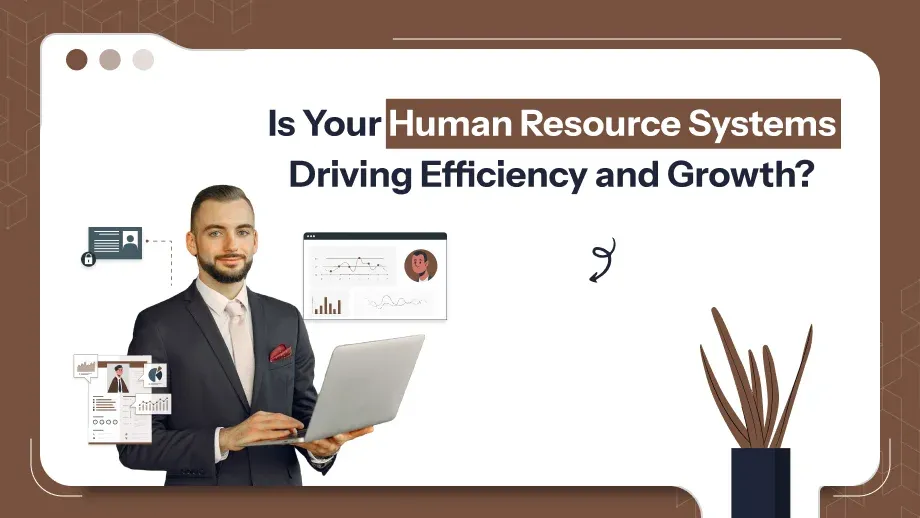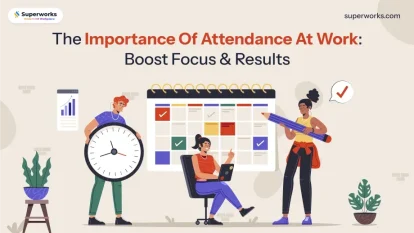
In today’s fast-paced business life, managing human resources effectively is essential for companies regardless of size. Human Resource Systems (HRS) are emerging as game changers and have transformed conventional HR operations into more efficient and technologically driven methods. From tiny startups to huge companies, the introduction of HR systems has been an essential element for reaching the goals of an organization and encouraging expansion.
This blog focuses on the definition of human resource systems, Their significance, their advantages as well and how they can cater to Indian business’s unique requirements.
What is a Human Resource System (HRS)?
A Human Resource System (HRS) is an extensive digital tool that integrates HR procedures to streamline and streamline the management of the workforce. It serves as a single-stop solution to manage the recruitment process and payroll as well as attendance, the compliance of employees, performance, and employee involvement.
The HR system definition could be described as “A software solution designed to manage and automate critical HRMS software in india functions for improving operational efficiency and employee satisfaction.”
Key Features of an HRS:
- Centralized employee data management.
- Payroll and tax compliance.
- Onboarding and Recruitment automation.
- Performance tracking and goal alignment.
- Leave and attendance management.
By addressing these areas, human resource goals provide a robust foundation for effective human resource management.
Who Uses Human Resource Systems in India?
Human Resource Systems (HRS) provide a variety of companies across India and address the specific requirements of companies across various segments. Here is a detailed look at who benefits from these systems:
Small and Medium Enterprises (SMEs):
The SMEs are at the heart of India HRMS economy. They often have limited resources. HRS Solution can aid SMEs in simplifying their HR processes including maintaining employee records as well as automating payroll as well as ensuring compliance. The systems can eliminate the need to have large HR teams making it possible for SMEs to be focused on their growth without putting up with administrative burdens.
Startups:
Startups thrive with flexibility and efficacy. With a limited workforce and potential for growth, startups can use the HR online systems to build strong HR frameworks at the beginning. Easy onboarding features automated attendance tracking and seamless payroll management enable startups to expand quickly without getting bogged down by the complexities of HR.
Large Corporations:
Many large companies employ thousands of people spread over multiple sites. HR management systems used in these organizations are vital for handling complicated HR processes, such as the management of multiple locations for payroll, performance tracking as well as compliance with various employment laws. These systems integrate with other business tools like ERP to ensure smooth operations across all departments.
Public Sector and Government Organizations:
The government departments as well as public sector companies in India are faced with the task of managing large numbers of workers. Systems HR tools are vital for ensuring the accuracy of the payroll process as well as compliance with regulations enacted by the law and streamlined management of data about employees. The systems play a function in increasing the transparency and accountability of the human resource audit operations.
Unlock the full potential of your workforce with Human Resource Systems.
Start transforming your HR processes today and see the difference!
Educational Institutions:
Universities, schools, and colleges universities make use of HRS to oversee the teaching staff and other non-teaching personnel effectively. From submitting leave applications and tracking the attendance of employees, HRS streamlines the administrative work of the educational sector.
Healthcare Sector:
Clinics and hospitals depend on HRS to manage their diverse personnel, including nurses, doctors, as well as administrative personnel. They help in ensuring the timely processing of payroll, in compliance with laws regarding healthcare as well as efficient scheduling shifts.
Retail and E-Commerce:
A large number of employees are frequently working shifts, and businesses in the retail and e-commerce industries rely on HRS for managing the policies on leave, attendance, and pay. These systems also help in tracking employee performance and ensuring compliance with labor laws across different regions
What Should a Human Resource System Do?
An ideal HR system must address the unique challenges faced by organizations, particularly in the Indian context. Here’s what a comprehensive HRS should do:
- Automate Routine Tasks: Reduce manual work by automatizing pay, leave tracking, and management of attendance.
- To ensure compliance: simplify adherence to Indian laws governing labor, such as EPF, ESI, and taxes.
- Increase Employee Engagement: Offer users self-service portals to keep track of their personal profile leave, performance, and other information.
- Data-Driven: Insights that Drive Decisions: Provide analytics as well as reporting to support strategic work planning.
- Customizable Features: Adapt to specific organizational needs, such as multilingual support and scalability.
Which HR Processes Do Human Resource Systems Cover?
Human resource systems are designed to handle a wide range of HR processes efficiently. Here are the key areas they cover:
1. Recruitment and Onboarding
- Automate hiring procedures with the use of applicant trackers (ATS).
- Automate the onboarding process to ensure an easy experience for the newly hired employees.
2. Payroll and Compliance Management
- Reduce the complexity of salary calculation in addition to tax deducts.
- Be sure to comply with rules like GST, EPF, and ESI in India.
3. Attendance and Leave Management
- Track attendance with biometric or mobile systems.
- Manage leave policies tailored to Indian festivals and labor laws.
4. Performance Management
- Track and set goals for employees with Key Performance Indicators (KPIs).
- Automate appraisals of performance to provide prompt feedback.
5. Employee Engagement and Development
- Provide training modules to upskill employees.
- Monitor engagement through surveys and feedback.
Benefits of Human Resource Systems for Indian Businesses
Adopting human resource software tools offers numerous advantages for Indian businesses:
- More efficient: Automating repetitive tasks can save time, and enables HR departments to concentrate on the strategic aspects of their work.
- Compliance Management: Ensures adherence to Indian law on labor and avoids penalty for non-compliance.
- Cost Savings: Cuts down on the cost of administration related to manual HR management.
- Data Security: Protects sensitive employee data with robust encryption and security protocols.
- Employee Satisfaction: Enhances employee experience through self-service portals and faster query resolutions.
- Scalability: Expand with your business to accommodate the growing staff.
How to Choose the Best Human Resource System in India?
The selection of the best HR system to suit your company isn’t easy. This is how you can make a shrewd decision:
- Review Business Needs: Be aware of your business’s HR needs and the goals of your organization.
- Take into consideration Local Compliance: Select one that meets Indian labor laws like PF, ESI, and the management of gratuities.
- Cost-effective Options: Search for affordable solutions, particularly in the case of a start-up or an SME.
- Integration Capabilities: Make sure it is compatible with other software like attendance and payroll software.
- Customization: Choose the system that can be specifically tailored to the needs of your particular industry.
- Help and Education: Select the vendor who provides solid customer service and education.
Popular choices for HRMS payroll software in India include platforms like Superworks.
Future of Human Resource Systems
The future of human resource systems in India is powered by cutting-edge technology including Artificial Intelligence (AI) and Machine Learning (ML). The new technologies are changing the way companies manage their workforces:
- AI-Powered Recruitment: Automating the process of candidate screening, and matching top candidates to jobs.
- Predictive Analytics: Providing analytics based on data to help employees anticipate their requirements and improve workforce planning.
- Enhancing Employee Engagement: Offering customized experiences using AI chatbots as well as self-service platforms.
- Mobile-First HR Systems: Ensuring accessibility for a diverse, mobile-driven workforce.
- Integration with other tools: Connectivity is seamless with other instruments like CRM and ERP to streamline operations.
By adopting these new technologies, you can make sure that companies remain flexible as well as competitive, and ready to face the challenges of the future.
Conclusion
In the end, human resources systems are essential for modern companies, particularly in India which has different workforce dynamics as well as strict compliance demands that require robust solutions. Automating mundane tasks to increase employee engagement in an efficient human resource model strategy guarantees efficiency, flexibility, as well as employee satisfaction.
The workplace is continuing to change, companies have to invest in modern HR systems and processes to be competitive and achieve their goals for strategic growth. If you’re an SME or large corporation choosing the best HRS will transform your HR processes and lead to the success of your organization. Therefore, you can take the first step toward transforming the way you run your human resource and development available today.







